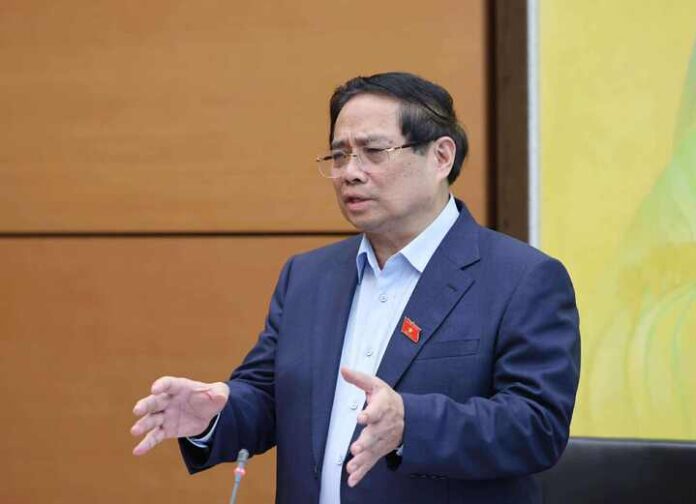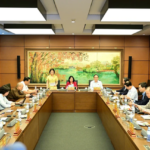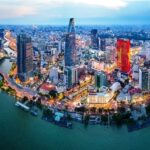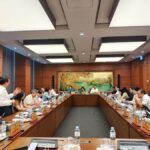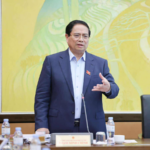On the morning of May 23, the National Assembly discussed several issues, including an additional assessment of the implementation of the socio-economic development plan and the state budget for 2024, as well as the implementation of the socio-economic development plan…
$230 Billion Stuck in Slow-Moving Projects
Speaking about cost-saving and anti-waste measures, Prime Minister Pham Minh Chinh mentioned that the Government recently reported to the National Assembly on long-stalled projects that have spanned multiple terms, often due to inappropriate policies.
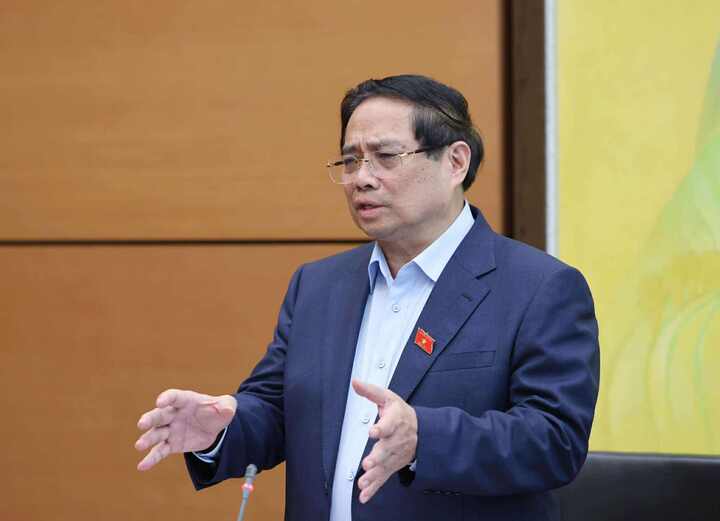
Prime Minister speaking at the discussion session on May 23.
For instance, a series of wind and solar power projects needed resolution and handling due to past inappropriate policies, which led to a rush of projects that were built without proper planning and procedures. The Government has since issued resolutions to address these issues, aiming to harmonize interests and share risks.
The Prime Minister emphasized that, according to local statistics, there are about 2,200 stalled projects nationwide. If resolved, these projects could unlock approximately $230 billion, equivalent to 50% of GDP. To release resources from these stalled projects, the Government is developing mechanisms and policies to present to authorized agencies for handling.
The head of the Government affirmed the stance of not legalizing wrongdoings but finding solutions. This includes addressing institutional and organizational issues, as well as legal and implementation obstacles. Notably, the Prime Minister pointed out the need to acknowledge this as a “disease” that requires treatment, but the treatment must be right.
“Treating a disease may involve surgery, which can be painful, or it may involve medication, which still incurs costs. Therefore, addressing the consequences cannot aim for a 100% recovery. We must accept losses, accept the pain, and accept what needs to be cut,” the Prime Minister stated.
And by enduring this pain, we will gain new lessons and experiences to avoid repeating the same mistakes in the future. “Resolving stalled projects is inevitable. We must accept some losses and consider them as tuition fees. From there, we can develop mechanisms and policies, determined to resolve and conclusively address these issues,” said Prime Minister Pham Minh Chinh.
No More Lagging Behind
Regarding solutions for the growth target, the head of the Government shared that in the current challenging global context, financial institutions forecast lower growth for this year compared to last year. However, Vietnam is going against the global trend by raising its growth target to 8% for 2025 and aiming for double-digit growth in subsequent years.
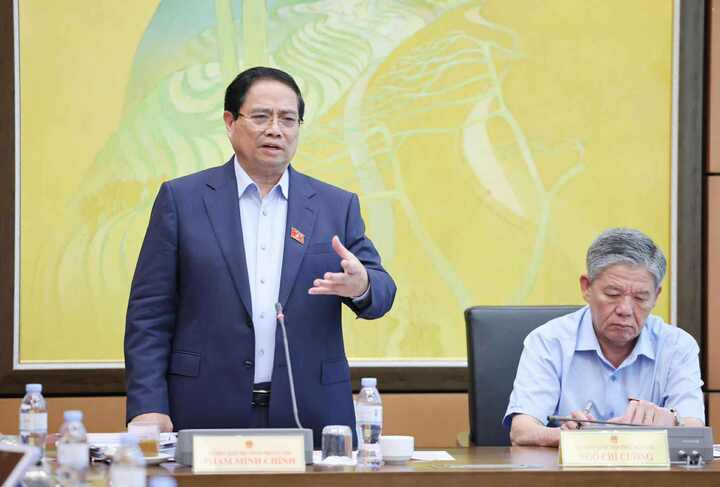
Prime Minister providing directions at the discussion session on May 23.
“So, how can we go against the trend but aim higher?” The Prime Minister asked and then shared three strategic breakthroughs that Vietnam is actively implementing: unblocking institutional bottlenecks, accelerating infrastructure development, and enhancing human resources.
The Prime Minister dedicated significant time to discussing the acceleration of the infrastructure development strategy. He emphasized that, in reality, logistics costs are about 17-18%, compared to the world average of 10-11%, which reduces the competitiveness of goods.
Therefore, it is necessary to continue promoting strategic transportation infrastructure in all five modes. For road transport, the goal is to complete at least 3,000 km of expressways by 2025. Next is the implementation of the railway system, which balances aviation and maritime transport as aviation is expensive, and maritime transport takes more time.
Railway transport has a large cargo capacity, is cost-effective, and can operate day and night. Therefore, it is crucial to upgrade the railway system and focus on constructing the high-speed North-South railway and the Hanoi-Lao Cai-Haiphong railway, connecting to China and further to Central Asia and Europe. This will diversify markets and products.
Regarding inland waterways, the Mekong Delta has a significant advantage. According to the Prime Minister, this year and the next will focus on this mode of transportation to reduce cargo costs and increase competitiveness.
For aviation, the Prime Minister mentioned that it is a popular mode of transport. To develop aviation, we need airports, aircraft, and airlines. “We cannot rely on just 2-3 airlines; we must develop more to create beneficial competition for the people,” the Prime Minister opined.
In terms of maritime transport, the Prime Minister emphasized the importance of constructing large ports that can accommodate the largest ships. With a 3,000-kilometer coastline, Vietnam needs to develop its port system and maritime transport. Several ports are currently being prioritized, such as Lach Huyen, Cai Mep-Thi Vai, Can Gio, and Hon Khoai, to boost maritime transport.
Emphasizing that integration is the trend of the times, the Prime Minister stated: “We cannot do things alone; we must integrate and not lag behind other countries. We must move forward, catch up, and surpass, taking the lead in the game. To do this, we must be proactive, enhance our competitiveness, and build the country’s brand.”
The Economic and Social Development and Budgetary Affairs: A Parliamentary Discussion
“On May 23rd, alongside reviewing and providing feedback on legal projects, the National Assembly will hold intra-party discussions regarding the implementation of the socio-economic development plan and the state budget for the first few months of 2025.”
Implementing an “Export Incentive” Policy for Businesses
To stimulate economic growth and achieve development targets, Delegate Hoàng Văn Cường suggests implementing aggressive measures to support export businesses. He proposes a “reward-based export policy”, which involves offering incentives and removing legal obstacles faced by stagnant real estate projects. Additionally, encouraging private investment and expediting a mechanism for placing orders with large enterprises for state investment tasks are key aspects of this strategy.
“In Extraordinary Times, Extraordinary Measures Are Needed”
In challenging times, developed nations opt for conservative growth targets. To buck this global trend and achieve ambitious growth, we require innovative solutions. Prime Minister Pham Minh Chinh asserts that “in these extraordinary times, we must adopt extraordinary measures, adapting with agility and efficiency.”

